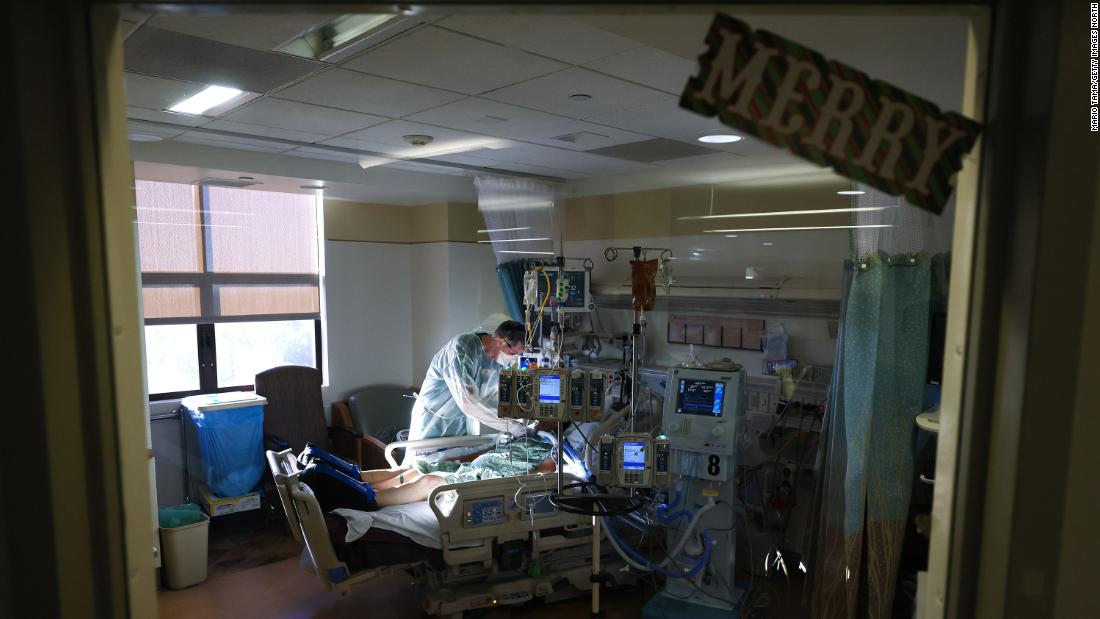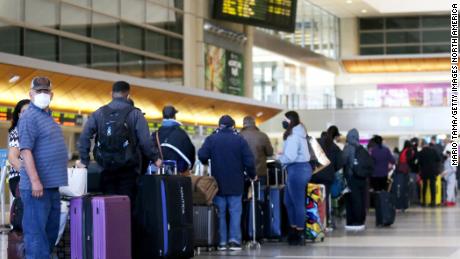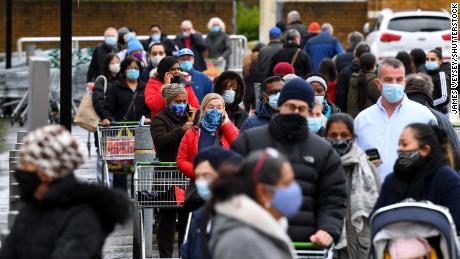About 200,000 people have tested positive every day for two straight weeks in the United States, a toll that has led to record numbers of people hospitalized
The US reported over 195,000 new cases of Covid-19 on Tuesday, putting the 7-day average of daily new cases at just over 215,000, according to data from Johns Hopkins University. That is only slightly changed from the number of newly infected back on December 10, when the 7-day average of daily new cases reached 212,000, which suggests that new cases may have flattened at a high daily average.
Yet because hospitalizations and deaths from Covid-19 generally follow a week or two after new cases, the number of Americans hospitalized and dying from the virus has continued to increase.
On Tuesday, the US reported 117,777 people hospitalized with Covid-19, the most since the pandemic began, according to the Covid Tracking Project. In addition, 3,400 people were reported dead of the virus on Tuesday, the second-highest number of Covid-19 deaths in a single day.
The nationwide data also somewhat masks how different states are dealing with the virus. States like California, Tennessee, Oklahoma and Rhode Island are seeing huge surges in new cases, while cases in much of the Midwest have declined since its recent peaks.
Whether the number of new daily cases begins to decline nationally from here is dependent, as always, on people’s behavior — and how America’s systems of power influence that behavior. Public health officials, like Dr. Anthony Fauci, have cautioned people against holding large, indoor, unmasked gatherings this Christmas and New Year’s.
“I want people to be more careful. I want them to limit traveling to the extent possible. And when you congregate, try to do it with a limited number of people,” Dr. Anthony Fauci, director of the National Institute of Allergy and Infectious Diseases, told CNN on Tuesday.
“If we can do that now and get through this season, enjoy it to the extent that you can, but it is not going to be the way a normal Christmas season is. As we get through that, the light at the end of the tunnel is the vaccine.”
Concern around UK variant
Scientists advising the UK government have estimated that this variant could be up to 70% more effective at spreading than other variants.
Peter Horby, chair of the New and Emerging Respiratory Virus Threats Advisory Group (NERVTAG), said Monday that experts “now have high confidence that this variant does have a transmission advantage” over other variants.
The UK variant does not appear to cause more severe disease, and it appears that the Pfizer-BioNTech and Moderna vaccines will still be effective.
Has this strain made its way to the US yet? Researchers studying it think it likely arrived in the US in mid-November, and that many people in the US could already be infected.
“If I had to guess, I would say it’s probably in hundreds of people by now,” said Michael Worobey, head of the department of ecology and evolutionary biology at the University of Arizona. “It’s very possible it’s arrived multiple times in multiple places.”
Scientists have scoured genetic sequences of coronavirus in the US to see if any match up with the UK variant. So far, they haven’t found any, but they say that’s likely because the US surveillance system isn’t catching them.
“It could be in the United States, and we might not have yet detected it,” Assistant Secretary for Health Admiral Brett Giroir said Monday.
Dr. Fauci says Biden administration will be different
Dr. Fauci predicted the incoming Biden administration won’t send “mixed signals” when it comes to communication on the coronavirus pandemic.
“There will probably be a uniformity of message instead of mixed signals,” Fauci told the FiveThirtyEight podcast, which aired Tuesday. “I think there’ll be more central guidance as opposed to leaving the states completely on their own and letting them do things the way they want to do it.”
Fauci, President-elect Biden’s chief medical adviser, said he believes the biggest hurdle for Biden is going to be the “divisiveness” in American society.
“It’s unfortunate that we’ve plowed through a historic pandemic, like nothing we’ve ever seen in 102 years, and it’s been done in the context of a great deal of divisiveness in society,” Fauci said. “I don’t think that necessarily is going to change right away with the change of administration.”
Fauci was asked, based on how President Donald Trump has handled the pandemic, how the President could have saved more lives.
“Obviously, there have been some bumps in the road,” Fauci said. “But, in general, particularly when you look at the science and the vaccine success, that is huge. I mean, that’s something that’s really quite unprecedented.”
He also said when it comes to fighting a pandemic, a nation can always improve their response.
“Obviously, you could always look back at your public health response and say, ‘Could you have done better?” And the answer is: Of course.’ I think any country looking back at their response will say that they could have done better.”
CNN’s Shelby Lin Erdman and Elizabeth Cohen contributed to this report.
![]()






